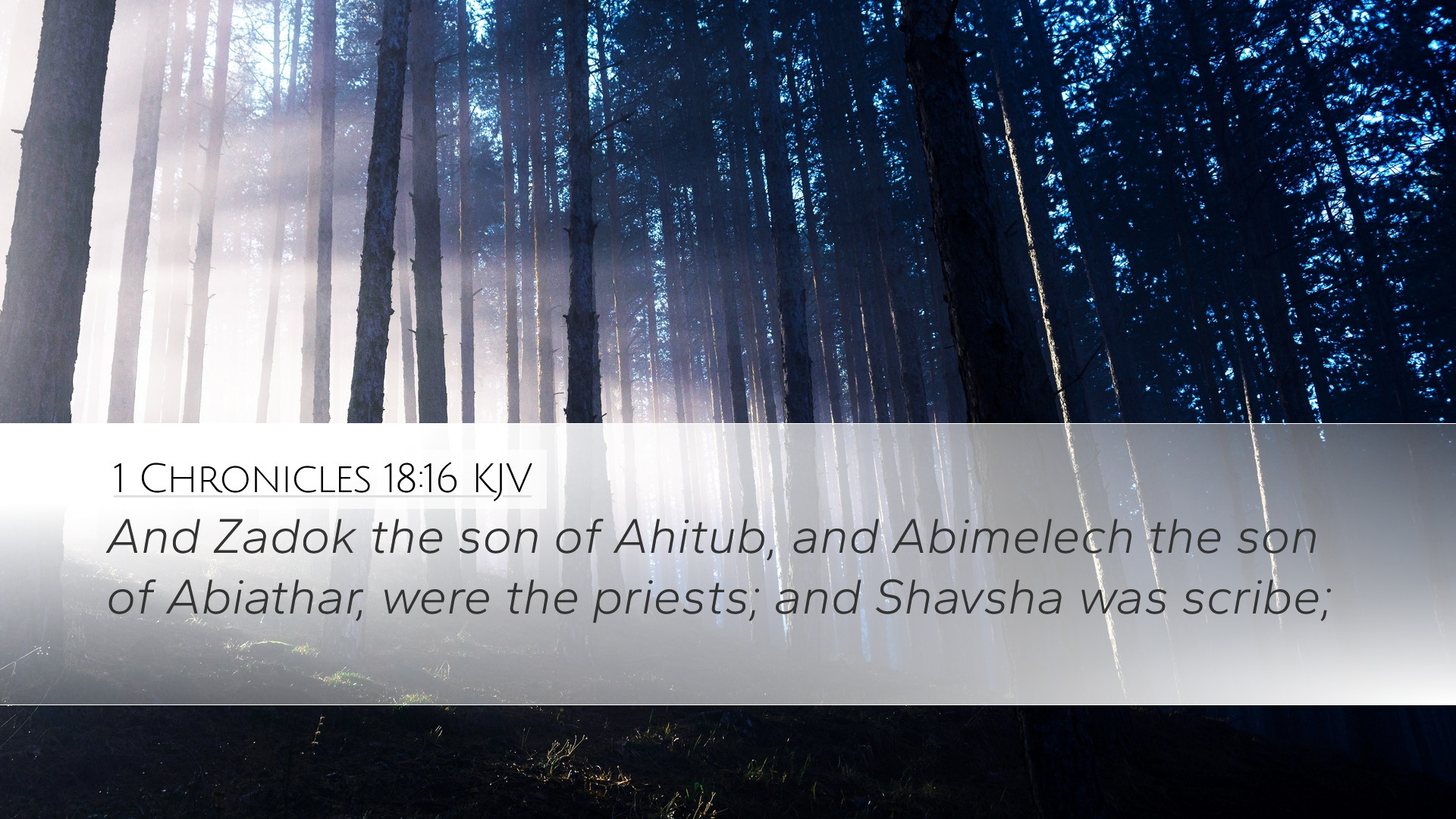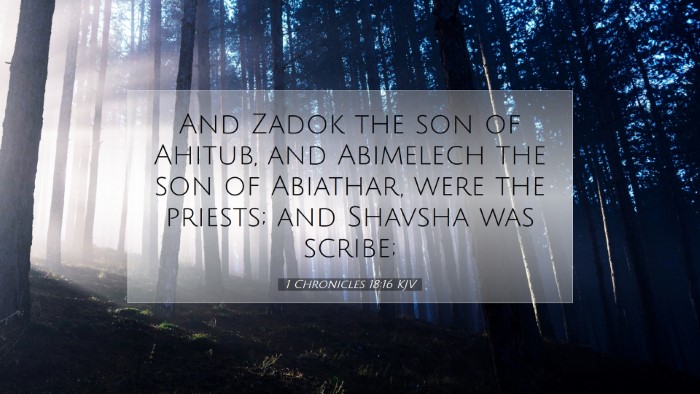Commentary on 1 Chronicles 18:16
Verse: 1 Chronicles 18:16 - "And Zadok the son of Ahitub, and Abimelech the son of Abiathar, were the priests; and Shisha was scribe;"
Introduction
This verse serves as a pivotal mention of key figures in the administration of King David's reign. Their roles reflect not only their personal attributes but also the significance of priestly leadership and governance in Israel’s history. This commentary synthesizes insights from esteemed public domain commentators such as Matthew Henry, Albert Barnes, and Adam Clarke, aiming to provide a meaningful exploration for pastors, students, theologians, and Bible scholars.
Historical Context
The context of 1 Chronicles is often viewed through the lens of the post-exilic community, with a focus on the restoration of proper worship and leadership in Israel. This chapter highlights the organization of David's kingdom, which is crucial for establishing a foundation for future worship and governance. The mention of Zadok and Abiathar as priests underscores the importance of legitimate priesthood in the worship of Yahweh.
Analysis of Key Figures
Zadok the Son of Ahitub
Zadok, of the line of Aaron, emerges as a significant priest during David's reign. His lineage not only establishes him as a rightful priest but also signifies the continuity of true worship in Israel. Matthew Henry notes that Zadok's loyalty to David during Absalom's rebellion affirmed his judicial and spiritual leadership. This positions him as a mediator between God and the people, integral to the kingdom's religious life and governance.
Abimelech the Son of Abiathar
Abiathar, the son of Ahimelech, is introduced here as a contrast to Zadok. Having escaped the massacre of the priests at Nob, Abiathar initially allied himself with David but later sided with Adonijah against Solomon. Albert Barnes comments on this division, highlighting that David's choice to include Abiathar illustrates the complexity of human loyalty and divine purpose within the priestly lineage. Their roles exemplify the tension and responsibility that come with religious authority.
Shisha the Scribe
The mention of Shisha as a scribe introduces an administrative aspect to David's reign. Scribes played a crucial role in the maintenance of the law and the documentation of history and governance. Adam Clarke emphasizes that the function of the scribe is not merely clerical but involves a significant theological responsibility, interpreting and teaching the law. This positions Shisha as a key figure in ensuring that the king aligned his policies with the divine statutes.
Theological Implications
The roles of these figures point to the intertwined nature of spiritual and civil leadership in ancient Israel. The presence of a robust priesthood under Zadok and Abiathar signifies that governance cannot be divorced from divine ordinance. As Matthew Henry eloquently states, “The prosperity of a nation greatly depends upon the integrity of its priests.” This underscores the imperative for modern church leaders to understand the historical weight of their roles in reflecting God’s justice and mercy in contemporary society.
Leadership Lessons for Today
- Divine Authority: Leaders must recognize that their authority is divinely ordained, requiring accountability and fidelity to God’s commands.
- Unity in Purpose: The division seen in the priestly lines encourages unity among leaders to prevent factions that hinder spiritual progress.
- Documentation of God’s Work: Just as Shisha recorded the events of the kingdom, modern leaders are encouraged to document and share God’s work in their ministries.
Conclusion
1 Chronicles 18:16 presents essential insights into the unfolding narrative of Israel’s leadership and the interplay between priesthood and kingship. The complexities found within the characters of Zadok, Abiathar, and Shisha remind us that every leader bears the responsibility of reflecting God’s glory and guiding their people faithfully. As we engage with this passage, may it challenge and inspire leaders today to pursue integrity, unity, and an unwavering commitment to God’s will.


